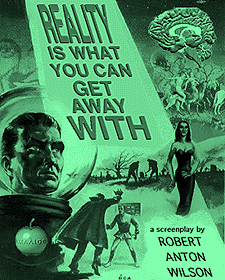
Firstly the blog has been idle but I haven't. The book (The Ambiguity Advantage: what great leaders are great at) has been published (Palgrave Macmillian) and I have been very busy as a result. Anyway here it is again.
So what is reality and how can you get to it? Why does it matter and what's the purpose behind the question?
Here are some thoughts on these questions. In the best traditions of awards we'll tackle these in reverse order.
The purpose behind questions about reality in problem solving is that it is all too easy to end up solving the wrong or a non - existent problem. Let me give an example from some work I have been doing recently in a large organisation. The scenario is that the Director of HR has a problem. The problem as she saw it was that a member of staff was breaking one of the organisations many regulations. The offence was that the individual in question was discovered to be running quite a nice consultancy, thank you. He was it appeared putting his talents to use earning more in his spare time than he was working for the organisation.
There were no complaints from within the organisation in question about this particular employees time keeping or work. Indeed he was considered to be amazingly productive having a first rate track record of developing quality products in time frames no one else could match. He had many creative ideas and those he settled on were almost all winners. In anybody's book this employee was a real asset, a star employee... except to was breaking the rules. He hadn't asked permission from the Director of HR. The HR director also knew that this employee kept his distance from HR and had on a couple of occasions been reported to have questioned the efficiency, thinking and ability of this department.
When interviewed the HR Director was clearly upset about this individuals behaviour. and (and this is important) was having an observable negative emotional reaction to him.
I am sure you can guess the HR directors solution to the issue was bearing in mind that the only offence committed was that he hadn't asked permission to do work outside. There was no evidence that he was using the organisations resources or doing anything that was in competition with this organisation.
Yes he was sacked leaving a lot of people in the organisation incredulous at his sudden departure. Both the HR director and the (ex) employee were interviewed.
First lets look at the rationale of the HR Director:
Q: Why was he sacked?
A: He broke the regulations.
Q:He was considered to be the most productive and creative employee xxxxxx (the organisation) had.
Pause at this point she started to look uncomfortable
A: Look I don't make the regulations and he broke them.
Q: Some people think xxxxxx have lost one of their best employees and that includes all of the heads of departments.
A: Yes but if you let one get away with breaking the rules it send the wrong message out.
Q: What was his reason for breaking the rules.
A: I'm not sure, greed I suppose.
Q: Did you ask him why he was behaving like this?
A: Er well no not really it's obvious isn't it?
Q: Did he give any explanation?
A No not at all, which is typical of his arrogance.
Q: Arrogance?
A: Yes he was very arrogant.
Q: In what way?
A: He thought he knew it all. He thought he was superior to everyone.
Q: Can you give me an example?
A: He was always questioning every thing and criticising.
Q: Did you like him?
A: I didn't dislike him (she coloured up). Pause He was very critical you know and he broke the rules, he was a maverick, not a team player.
Q: Would it surprise you t0 hear that he was regarded as being one of the leading lights in his area and around the company he was seen as being brilliant. The sorts of comments I have had include and I quote "He was amazing, a real legend around all of xxxxxx." "He had droves of people coming to him form every area of the business. He was so busy it was difficult to get to see him." "He worked so fast. Once he had an idea if you left him to it it would just happen". "He was very funny, I liked him. He hated time wasting administration and committee meetings. We found that as long as we let him get on with it things would just happen as if by magic. If he had to go through a committee he would struggle as they would slow things down and change them. "
A: No reply
Q: Why was he sacked?
A: I think I have had enough of these questions. He broke the rules and this is confidential to the company and I am not going to discuss it any further.
And so the interview ended.
The (ex) employee was interviewed:
Q: Why were you sacked?
A: A couple of reasons I think. The regulation reason was that I broke some rules about doing other work without getting permission which is fair doo's. The underlying reason I think had more to do with xxxxxxxx xxxxxxx (HR director). I got the feeling she wanted rid of me. The way it happened was odd. She was clearly worked up and started by saying "I'm not as stupid as you think I am". She then said she had investigated me and found that I was doing work outside and I hadn't asked her. She appeared to be offended that I hadn't asked. This wasn't a clinical sacking. I said that it can't have been much of an investigation as I hardly kept it a secret. Indeed I had previously asked for her reference under the companies enterprise scheme where employees can use a room set up to help people set up their own business. She refused as she said I was too busy.
I had then asked her if I could go part time so I can develop my external work and she refused.
Q: Had you criticised her openly
A: (Laughs) I suppose, what I actually criticised was the nature of the thinking of HR. It has a bureaucratic view of the world. Let me give you an example. After a recent employee survey they got feedback that there was too much bureaucracy. Their response was to set up a committee with minutes and everything to fight bureaucracy! They even developed a policy about bureaucracy. Yes I made a joke of that and other things they have done.
Q: Why were you doing other work?
A: I suppose I have always done this. It's my time, it's not in conflict with xxxxxx, in fact it has brought a lot of work in and help me develop my thinking. It is very easy to get quite insular in this business. My last boss at xxxxxxxxxx (another company) encouraged it as it widened our thinking. I suppose they money is nice but that's not it, I have many interests and love doing stuff. I'm not a 9-5 person and love keeping busy.
Q: You don't appear too upset.
A: I miss my friends at work but I'm very busy and earning more so it's ok. I just know that y departure has caused problems for the group which I am sorry for because I like the people there.
A nice example of different realities coming up with different solutions. What I am finding interesting at the moment is how the emotions effect people's perception of reality and the causal chain that this creates in problem solving and perceptions of risk and ambiguity.
 Further observations on the exploration of reality and how it effects problem solving and our perceptions of Ambiguity... It strikes me that there are always a number of realities present at any one time. The problem is that each of our realities, whilst they can be categorised is so inextricably linked with the others that they have interdependent relationships.
Further observations on the exploration of reality and how it effects problem solving and our perceptions of Ambiguity... It strikes me that there are always a number of realities present at any one time. The problem is that each of our realities, whilst they can be categorised is so inextricably linked with the others that they have interdependent relationships.